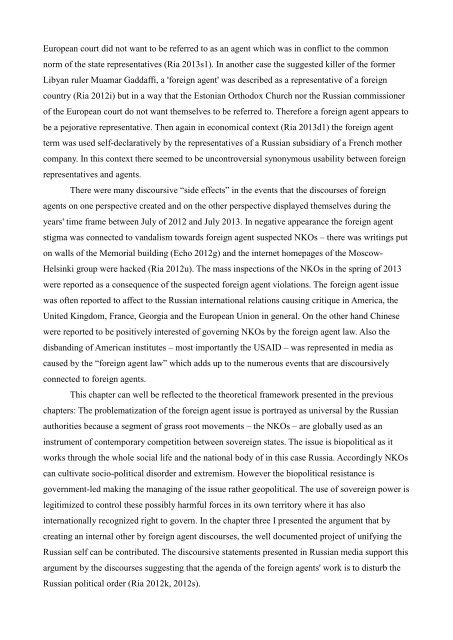Foreign Agents in Russia - Doria
Foreign Agents in Russia - Doria
Foreign Agents in Russia - Doria
Create successful ePaper yourself
Turn your PDF publications into a flip-book with our unique Google optimized e-Paper software.
79<br />
European court did not want to be referred to as an agent which was <strong>in</strong> conflict to the common<br />
norm of the state representatives (Ria 2013s1). In another case the suggested killer of the former<br />
Libyan ruler Muamar Gaddaffi, a 'foreign agent' was described as a representative of a foreign<br />
country (Ria 2012i) but <strong>in</strong> a way that the Estonian Orthodox Church nor the <strong>Russia</strong>n commissioner<br />
of the European court do not want themselves to be referred to. Therefore a foreign agent appears to<br />
be a pejorative representative. Then aga<strong>in</strong> <strong>in</strong> economical context (Ria 2013d1) the foreign agent<br />
term was used self-declaratively by the representatives of a <strong>Russia</strong>n subsidiary of a French mother<br />
company. In this context there seemed to be uncontroversial synonymous usability between foreign<br />
representatives and agents.<br />
There were many discoursive “side effects” <strong>in</strong> the events that the discourses of foreign<br />
agents on one perspective created and on the other perspective displayed themselves dur<strong>in</strong>g the<br />
years' time frame between July of 2012 and July 2013. In negative appearance the foreign agent<br />
stigma was connected to vandalism towards foreign agent suspected NKOs – there was writ<strong>in</strong>gs put<br />
on walls of the Memorial build<strong>in</strong>g (Echo 2012g) and the <strong>in</strong>ternet homepages of the Moscow-<br />
Hels<strong>in</strong>ki group were hacked (Ria 2012u). The mass <strong>in</strong>spections of the NKOs <strong>in</strong> the spr<strong>in</strong>g of 2013<br />
were reported as a consequence of the suspected foreign agent violations. The foreign agent issue<br />
was often reported to affect to the <strong>Russia</strong>n <strong>in</strong>ternational relations caus<strong>in</strong>g critique <strong>in</strong> America, the<br />
United K<strong>in</strong>gdom, France, Georgia and the European Union <strong>in</strong> general. On the other hand Ch<strong>in</strong>ese<br />
were reported to be positively <strong>in</strong>terested of govern<strong>in</strong>g NKOs by the foreign agent law. Also the<br />
disband<strong>in</strong>g of American <strong>in</strong>stitutes – most importantly the USAID – was represented <strong>in</strong> media as<br />
caused by the “foreign agent law” which adds up to the numerous events that are discoursively<br />
connected to foreign agents.<br />
This chapter can well be reflected to the theoretical framework presented <strong>in</strong> the previous<br />
chapters: The problematization of the foreign agent issue is portrayed as universal by the <strong>Russia</strong>n<br />
authorities because a segment of grass root movements – the NKOs – are globally used as an<br />
<strong>in</strong>strument of contemporary competition between sovereign states. The issue is biopolitical as it<br />
works through the whole social life and the national body of <strong>in</strong> this case <strong>Russia</strong>. Accord<strong>in</strong>gly NKOs<br />
can cultivate socio-political disorder and extremism. However the biopolitical resistance is<br />
government-led mak<strong>in</strong>g the manag<strong>in</strong>g of the issue rather geopolitical. The use of sovereign power is<br />
legitimized to control these possibly harmful forces <strong>in</strong> its own territory where it has also<br />
<strong>in</strong>ternationally recognized right to govern. In the chapter three I presented the argument that by<br />
creat<strong>in</strong>g an <strong>in</strong>ternal other by foreign agent discourses, the well documented project of unify<strong>in</strong>g the<br />
<strong>Russia</strong>n self can be contributed. The discoursive statements presented <strong>in</strong> <strong>Russia</strong>n media support this<br />
argument by the discourses suggest<strong>in</strong>g that the agenda of the foreign agents' work is to disturb the<br />
<strong>Russia</strong>n political order (Ria 2012k, 2012s).
















